The tennis entourage pays its way for stars like Murray
- Published
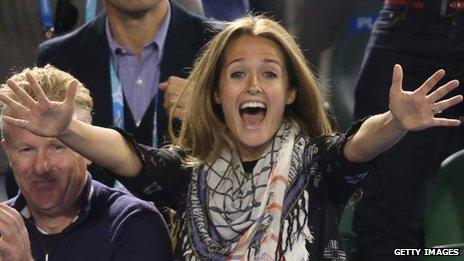
Andy Murray's girlfriend Kim Sears cheers him on in Australia
It is not often a player's entourage makes as many headlines as their on-court performance, but that is what happened to Andy Murray during his Australian Open semi-final win over Tomas Berdych.
Not only had there been a tense build-up to the game, given that one of Murray's former coaches, Dani Vallverdu, now works with Berdych, but during the match the Scotsman's fiancee Kim Sears was apparently caught on camera swearing in the opposing camp's direction.
It has all put the spotlight on players' entourages - those close friends and advisers who can be seen sitting in the VIP boxes at big games.
The entourage is the highly motivated family, financial and sporting team driving their man or woman to the top.
As with a rock star or an F1 driver, those behind the scenes form a super-professional and well-drilled team, each with a specific role to play to ensure that the player is as well-prepared and supported as possible - physically, mentally, and financially.
The more cash a player rakes in through prize money and endorsements, the bigger the potential entourage they can employ, with the top stars paying hundreds of thousands of pounds a year on support staff.

The Main Coach
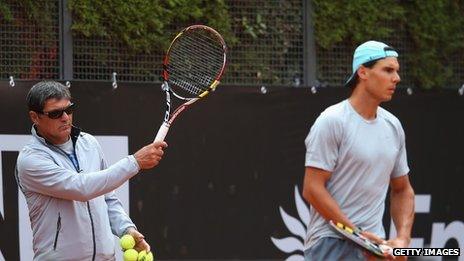
Toni Nadal has been known to bring in outside specialists to assist his nephew
They may not work all year round, but the chief coach is the main sporting point of contact with the player, honing his or her skills to a tournament-ready fine-pitch.
Often, but not always, a former pro themselves who understands the challenges of battling to Grand Slam finals.
They are able to impart the wisdom of their experiences and successes, such as Amelie Mauresmo with Andy Murray, or Boris Becker with Novak Djokovic.
However, Rafael Nadal's coach, his Uncle Toni, was never a top-ranked player, nor was Patrick Mouratoglou, coach of Serena Williams.
The principal coach is often also a defensive shield, and can provide another "public face" to the star.

'Return on investment'
"Taking an entourage around the world can be incredibly costly," says Simon Chadwick, professor of sports business at Coventry University.
"However, there must be a return on investment because if there was no benefit, particularly given the way these players are so carefully financially managed, then these extensive back-up teams would not be there."
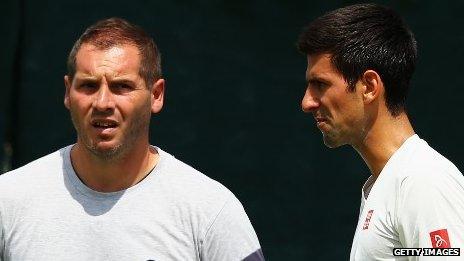
Novak Djokovic discusses fitness with his physio Milan Amanovic
At the top echelons of the game, most of these specialists will be on a basic financial retainer - plus a bonus from player prize money.
Obviously, the specialist's bonus is then bigger should their man or woman pocket a Grand Slam or a top-ranked ATP or WTA title.
Different players have differently configured back-room teams and not all of them will have the same-sized entourage, while some roles can be mixed and matched between staff.
But a full entourage generally consists of the main coach, a day-to-day coach, a strength and conditioning or fitness coach, physio, manager/agent, and romantic partner.
Other entourage members can include a hitting partner, a specialist coach brought in to work on just one stroke (such as Djokovic hiring Mark Woodforde in 2007 to improve his volleys), dieticians, as well as other family members or close friends.

The Manager/Agent
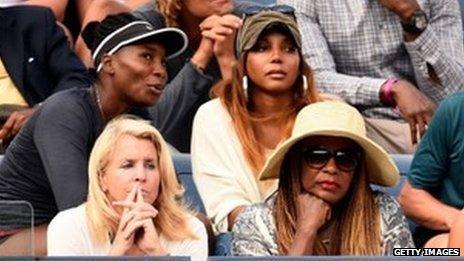
Williams family members with Serena's agent Jill Smoller (bottom left)
As well as providing psychological and moral support by being courtside at their client's games, they are there to monetise the player's brand while they are at the top for the relatively short span of their career.
At tournaments that means sorting out media appearances, meeting existing and potential new sponsors, and dealing with other player commitments.
They are also responsible for extending a player's economic well-being after their playing career.
They may not always travel, but might restrict appearances to Grand Slams and other major events.
If they are in situ for many years, they become almost surrogate family members.

'Freedom'
"It is an indication of how sophisticated modern sports, including tennis, have become that there are these large backroom teams," says Prof Chadwick.
"It is all part of the growth in sport of using coaches and analysts to achieve those small marginal benefits that will pay off over the course of a match.
"It is the extent to which these marginal benefits can bring the financial returns that justify the investment."
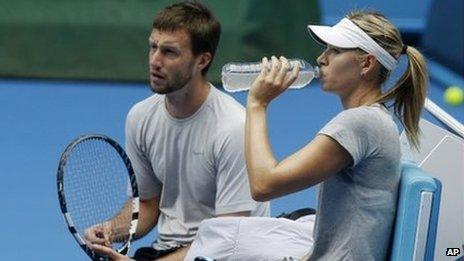
Maria Sharapova and Australian Open hitting partner Dieter Kindlmann
In addition, some players might hire a specialist coach for a short period to hone one area of their game, such as volleying.
"Some player will have a full entourage, specialists in every area," Jamie Feaver, professional performance coach at Team Bath-MCTA tennis academy told the BBC.
"But others will prefer to only have one or two people with them. Some, for example [French player] Jo-Wilfried Tsonga, at times have gone with no coach because he likes the freedom."

The Family
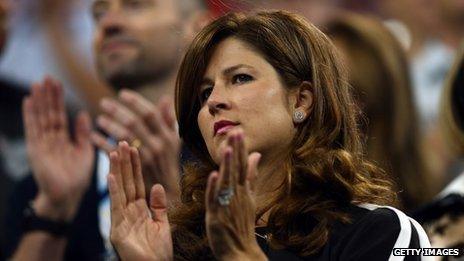
Roger Federer's wife Mirka is a familiar presence at his games
Ranges from romantic partner to parents and other relatives, as well as close friends who could be considered part of a wider family. Might have been involved with the player since their early years and are a major presence and support.
Judy Murray has witnessed all of Andy Murray's finest moments, and he has openly displayed his emotional thanks post-match. In their rise to the top, the Williams sisters have been supported by their family, including father Richard and mother Oracene.
However, there is always the chance said family member will be a loose cannon, with Bernard Tomic's father John perhaps the most notorious example.

'Insecure life'
For those coaches and trainers desperate to get their foot in the door in terms of a first high-profile job, they may initially take a very small retainer to be employed on such a glamorous sports circuit.
And while the rewards can eventually be lucrative, coaches and trainers on tour are always just a week or so away from getting sacked and being out of the game until another position becomes available.
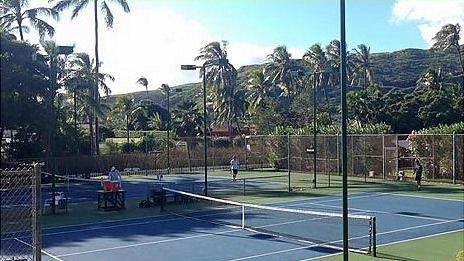
Money is tighter at the other end of the scale, such as the ATP Challenger Tour
"It's a very insecure way of life for coaches and trainers," says Mr Feaver.
At the lower levels, on the ATP Challenger Circuit for example, it is a different story as it is almost impossible, given players' financial circumstances, to hire a huge entourage.
Rather, a lower-ranking player will look to hire a "hybrid" back-up person - and on a straight salary, which offers some stability and financial planning for both parties throughout the tennis season.
"They will certainly look for a person with a variety of skills," says Mr Feaver.
"They will be coaches who can be practice hitters, and who can also oversee physical programmes, who can massage, and who can manage the logistics at events - from transport to practice courts to practice partners."
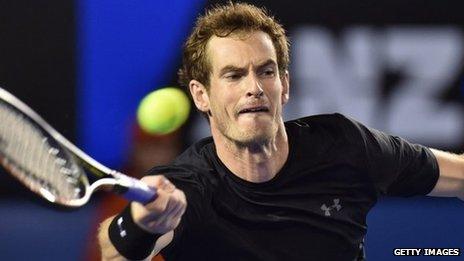
Entourage members can also soften a player's image
Such a tight budget means no room for family members, unless they pay for themselves, and that might come at a cost.
"Having partners, close family members and friends as part of your entourage provides a psychological boost, which enables better performance," says Prof Chadwick.
And, notwithstanding the latest ruction, he believes the female presence is good for Murray's image.
"I think there is a commercial aspect to this as well. Someone like Murray can sometimes seem edgy and not very accessible, so what Mauresmo, Kim Sears and his mother do is soften his image, which can only help with his marketing."